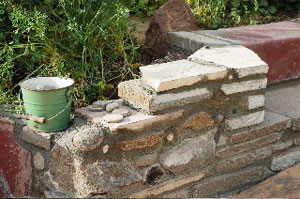Polluting Makes Vatican List of Grave Social Sins
 Over the course of a week of working with concrete,
Over the course of a week of working with concrete,
this landscaping job produced only one bucket
of wastewater. Credit: Ann Hutcheson-WilcoxAs a lifelong Catholic and former Catholic priest, I often find myself wishing that the Church would stick to what it knows best: the Sacraments. I wish the Pope would declare a 10-year moratorium on anyone with any authority in the Church saying anything at all about sexuality.
But sometimes the Vatican gets it right.
Polluting is a now a recognized social sin, along with another act that tends to wreck havoc on the environment, that is, contributing to the growing social and economic divide between rich and poor. The rich contribute inordinately to pollution and the poor suffer inordinately from it.
The Church has installed photovoltaics (PV) on the roofs of some Vatican buildings, and has recognized the scientific consensus that humans contribute to global warming. One of my teachers in the Divinity program at Notre Dame, Fr. Tim O'Meara, said that the Church responds quite slowly to crisis and change. "It spends twenty-five years denying the problem, twenty-five years quietly addressing it, and twenty-five years claiming that this is the way we've always done things." So by historical standards, the Church is moving with lightning speed.
